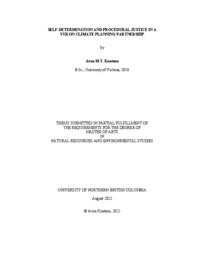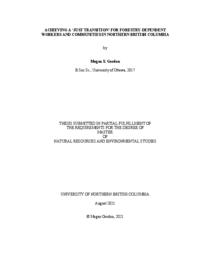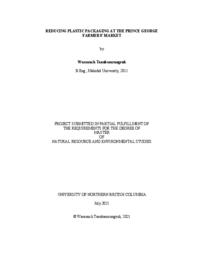Earley, Sinead
Person Preferred Name
Sinead Earley
Related Works
Content type
Digital Document
Origin Information
Content type
Digital Document
Origin Information
Content type
Digital Document
Description / Synopsis
After over 100 years of operation, the Norman Wells Oilfield located in the Northwest Territories is beginning the process of closure and reclamation. In negotiating the Sahtú Dene and Métis Comprehensive Land Claim Agreement (1994), Sahtú people have gained more power over environmental decision-making, including directing the goals and outcomes of reclamation projects. A case study approach was used to collect qualitative data over 8 weeks in Fort Good Hope, Northwest Territories and 3 days in Norman Wells, Northwest Territories. Data were collected through 41 semi-structured interviews using open-ended questions with Sahtú people and key informants and an analysis of past engagement records to examine the structures and processes for how Sahtú Dene and Métis have been engaged in the Norman Wells Oilfield project throughout history, and identify opportunities for their meaningful involvement in remediation, reclamation, and monitoring in the future. Findings reveal that past engagement and consultation from Imperial Oil with the Sahtú people has been culturally inappropriate. This has resulted in a loss of trust, violation of Dene principles of reciprocity, and overall ineffective communication. These research findings are intended to contribute to the conversation about the Norman Wells Oilfield closure and reclamation, as well as broader discussions on Indigenous peoples' involvement in environmental reclamation after resource extraction.
Origin Information
Content type
Digital Document
Description / Synopsis
Planning for community resilience and climate change requires new forms of engagement that are accountable to Indigenous peoples and the social and cultural upheavals associated with colonial harm. This thesis shows that climate governance requires partnerships and policy actions that reflect needs and priorities of communities in specific geographic, political, and cultural contexts. As a case study, it examines the development of the 2020 Our Clean Future (OCF) strategy by Government of Yukon and Indigenous partners. Through semi-structured interviews and document studies, the research applies a theoretical lens of procedural justice and self-determination to the OCF process. Outcomes from this research offer a set of policy cycle considerations and recommendations for future environmental planning partnerships that include taking a rights-based approach, increasing capacity for collaboration in multiple areas, stronger integration of culturally diverse ways of knowing and doing, and targeted urban Indigenous engagement. Findings suggest OCF can serve as a useful procedural policy tool that supports Indigenous self-determination if lessons learned from the process are carried forward in future environmental planning partnerships.
Origin Information
Content type
Digital Document
Description / Synopsis
‘Just transition’ is a burgeoning policy goal, as well as an academic and social justice concept. Governments are increasingly operationalizing just transition policy approaches as they realize the scale and scope of industrial transition needed to meet climate targets, recognizing the impact this transition will have on workers and communities. However, there is little consensus on what is considered ‘just’ and ‘fair’. Through interviews with over 40 participants in the Cariboo Regional District (during the COVID-19 pandemic), this thesis will provide insights into the concept of a just transition according to forestry-dependent workers and communities. This research examines the Government of British Columbia’s ‘Supports for Interior Forestry Workers’ programs in response to the 2019 forest sector downturn and describes lessons about how impacted workers and community members evaluate transition management based on their perceptions and values. This work also offers principles and practices for delivering just transition policy and program supports. This research suggests that the Government of British Columbia must adjust existing supports and proactively develop policy measures to manage and mitigate the negative consequences of future transitions in collaboration with other key actors.
Origin Information
Content type
Digital Document
Description / Synopsis
Plastic pollution, a global problem, contributes to detrimental impacts on the environment. To mitigate plastic pollution locally,farmers’ market scan play a role in reducing plastic consumption. Many studies have suggested that customers and vendors are aware of environmental problems. Yet vendor environmental awareness does not always result in appropriate actions, as many vendors still rely on plastic packaging. To investigate the reasons for such reliance, I conducted vendor interviews and a customer survey at the Prince George (B.C.) Farmers’ Market. The results show that the barriers to reducing plastic include packaging availability, characteristics, functions, and price. Based on interview results, I developed a manual to support vendors interested in reducing plastic packaging at their stalls. I also offer recommendations as to how policy makers can motivate vendors and customers to reduce plastic consumption, such as offering customers reusable bags and organizing plastic-free events.
Origin Information






